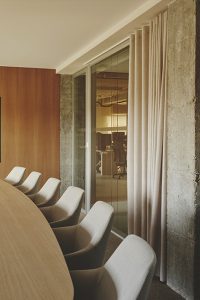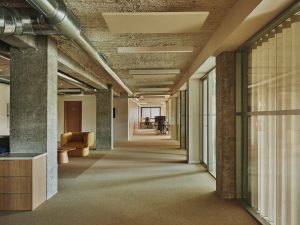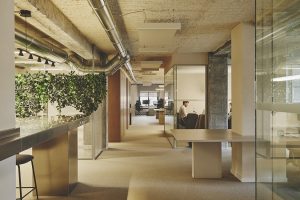At Destudio, we believe that spaces should speak the same language as the brands they represent. That’s exactly what we’ve done with the design of the Prosolia Energy offices, an international company specializing in solar energy solutions. Their identity—deeply rooted in sustainability, innovation, and dynamism—has been the foundation for shaping a workspace that reflects their philosophy in every corner.
A space that generates positive energy
Located in Valencia, the Prosolia offices have been conceived as an open, collaborative, and flexible work environment, with people’s well-being at its core. Natural light and noble materials such as wood, glass, and textile coverings create a warm and comfortable atmosphere. In terms of color, white dominates the space, bringing brightness and a sense of spaciousness, while earthy tones and natural materials add warmth. As a contrast, we introduced bold accents in colors like orange and yellow, reinforcing Prosolia’s brand identity without disrupting the overall harmony of the design.
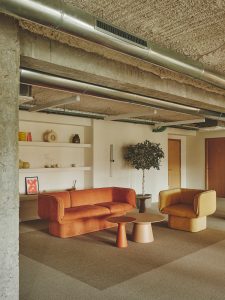
From the outset, our aim was to create a natural and welcoming atmosphere that aligns with the company’s values. Indoor vegetation and sustainable finishes underscore this commitment, creating a healthy environment in tune with the planet.
Architecture That Reflects Identity
The spatial layout organizes different work zones: open workstations, meeting rooms, private offices, collaborative areas, and a break area designed for relaxation. All of this with an efficient layout that adapts to new hybrid work models.
The design elements go beyond aesthetics—they communicate. Glass partitions promote transparency, custom furniture adds personality, and graphic details weave Prosolia’s essence into the daily lives of its teams.
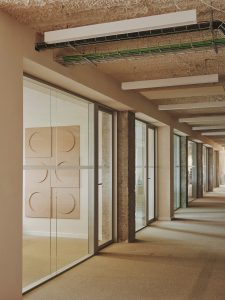 Working with Purpose
Working with Purpose
For us, this project is a clear example of how interior architecture can be a strategic tool to reinforce corporate culture. Prosolia’s offices don’t just reflect who they are—they express where they’re headed.
In today’s business landscape, where sustainability is no longer optional but essential, designing spaces aligned with this purpose is more than ever a responsibility.
